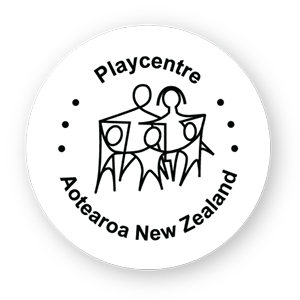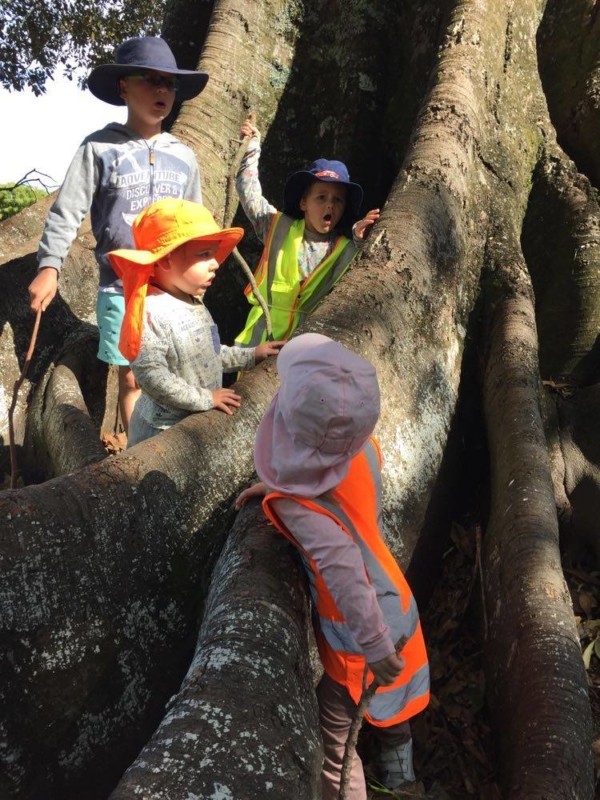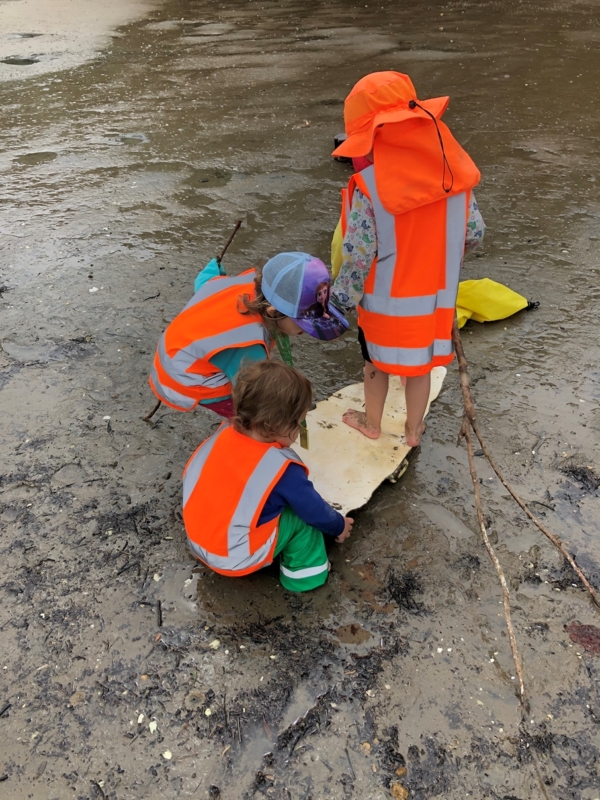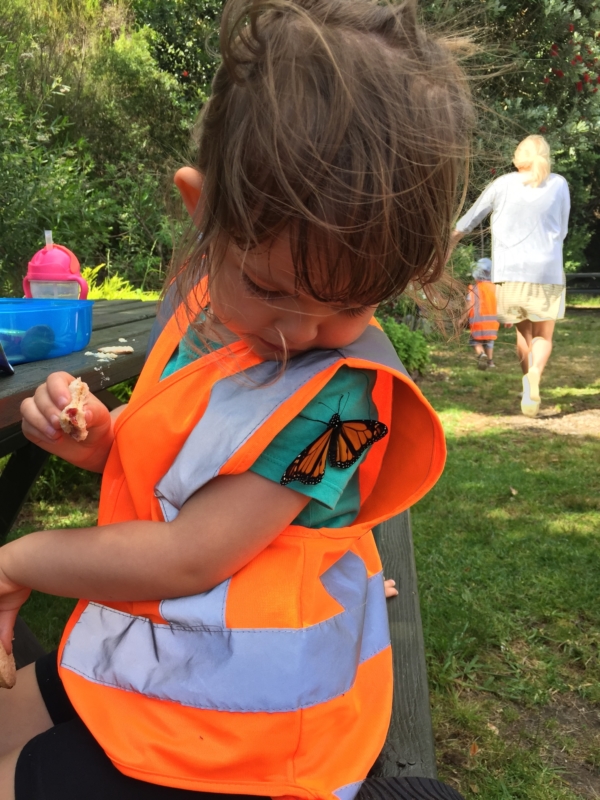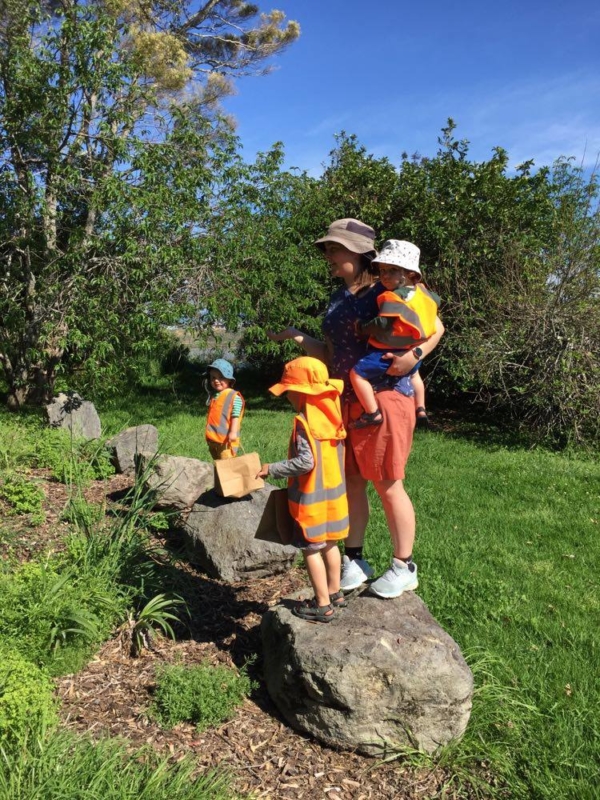Omokoroa Playcentre has recently launched outdoor play sessions. These are proving to be highly successful and a hugely positive addition for their tamariki – and parents alike!
Exploring the local parks, reserves and beaches, the children (from as young as 6 months to 5 years old) have been discovering just how beautiful and diverse nature is and how to be safe in the outdoors, fostering tuakana teina, and developing their gross and fine motor skills in a range of environments – cold, rainy, muddy, slippery, watery, puddley, squelchy, steep, weedy, fruity, and more.
Learning abounds
These sessions continue the child-led and ‘anything goes’ philosophy of Playcentre, but offer so many more options to see, hear, smell, touch and even taste that just don’t exist within the grounds and bounds of a centre. Climbing trees; clambering over enormous roots, rocks and boulders; examining strange flowers; balancing and teetering along natural ledges, wall-tops, pathways and bridges; scaling hills and rolling down again; finding bugs; squelching and losing feet in muddy puddles; hiding in caves; building confidence with fast-moving or immersive open water play. All these providing such a rich supply of endless learning and experiences, as well as invaluable mental, physical, social and emotional development. One of our 15 month olds recently learned what happens when you are finally allowed to freely run through a large muddy puddle and you lose your balance! Face first in the mud. Lucky for waterproof clothing and a wet cloth!
So far we have been going back to the same place several times before moving on to a new location. This has been good for building the children’s confidence in an area as it becomes more familiar; giving them something to anticipate and look forward to; and allows us to fully explore the area from every angle and all its possibilities. We notice things that are different each time we go and draw conclusions as to why or what might be happening – for instance, we noticed on our third visit to the quarry park that the old water wheel was moving quite quickly that day compared to previous weeks, and we wondered where all of the water had come from, even though there hadn’t been much rain recently. Lots of opportunities for wondering, considering, thinking, and problem solving.
We’ve observed amazing wildlife – herons, oyster catchers, and plovers feeding; bees feeding on pohutukawa flowers; crabs scurrying; we’ve listened to tui up close and even watched one feeding from a flower less than a metre away; heard frogs croaking; and examined chrysalises up close with a handy magnifying glass, which also proved useful for spotting caterpillars on the plants. The tamariki were especially taken by monarch butterflies walking along their arms and were lucky to be able to release some from the butterfly house. Ben (3yrs) particularly enjoyed the sensory aspect of smelling leaves and flowers of herbs, and examining seeds then placing them back on the dirt so they could grow.
Many aspects of Te Whariki are met – belonging, communication, exploration, contribution, wellbeing. Making sense of the natural, social, physical and material worlds; connecting links with the family and the wider world are affirmed and extended; moving confidently and challenging themselves physically (climbing, wading, digging, rolling); extending physical skills and learning more confidence with their bodies; emotional wellbeing is nurtured as they learn to look out for each other; limits and boundaries of acceptable behaviour (practising water safety); talking to each other and showing each other discoveries from the session; the importance of spontaneous play is recognised; and experiences are made accessible for all ages and stages.
Meaningful moments
On our first session we found citrus trees full of sweet-smelling blossoms, mandarins and grapefruit. The colours and smells were intensified because of the rain – it was just beautiful! It was a great introduction to what these sessions were going to be all about. There was an abundance of fruit on the ground which made for fun foraging for the kids – not to mention a healthy addition to a morning tea snack. This was a great opportunity to discover where our food comes from. Three year old William kindly shared his gatherings with everyone and was adamant in making sure everyone got a mandarin – a lovely example of tuakana teina.
A couple of weeks later once the kids were familiar with the area, we had a ‘Nature’s Treasure Hunt’, foraging around for pinecones, bugs, leaves and flowers, something ‘wild and wonderful’. I didn’t realise until later how much of a thrill it would be for one of our 2 year olds just to have his own bag to carry and put things in. The bag turned out to be much more of a treasure than the things that nature offered up for him that day.
Mia (5yrs) and Alyssa (3yrs) found feathers (huru) to put in their bags. Mia’s was spotty and Alyssa asked her “What type of bird might have that feather?” Mia replied “A spotty bird.” Mia helped Alyssa fill her bag with treasures – it was fantastic watching more tuakana teina taking place!
One rainy day we walked around the beach-head and the kids found an old piece of boat floating in the water. Climb aboard! At first it was a surfboard, then a boat, then a pirate ship! They gathered long sticks to be their oars and sang a made up song together. Finally Mickey (4yrs) told the others “Get off everyone, we’ve run aground”. Alyssa (3yrs) found a stick covered in barnacles and exclaimed “this is my tiger stick with sharp claws”. The imaginations were flowing and the children demonstrated great teamwork as well as fostering friendships.
Bicultural connections
Opportunities abound for plenty of te reo – and it seems to flow much more naturally and easily than at centre I’ve found. There’s always plenty of cultural Maori sites to be on the lookout for (even in an area as small and unpopulated as Omokoroa and its surrounds) – pa, marae, totems and tiki on reserves which on the surface might seem randomly placed, but with a little attention have significant meaning.
Any good reason to start will do
So what was behind starting these outdoor based sessions? We were already running three sessions a week, one of which was (newly) at capacity and we were anticipating a need to offer another day. Many of our members were already coming to two or three sessions at the centre each week so we wanted to provide something a little different and extend the opportunities.
It was our centre president EJ who initiated the idea, mainly because she wanted to extend her own 3 year old and get extra Playcentre days for him. But the result has been so much more than that – “I have loved the sessions as it tests my knowledge of outdoor practice, and identification of plants and birds outside our backyard and urban setting”.
Jen, co-leader of the sessions, goes on to say that for her it was about “creating an outdoor session that was accessible to all ages, not just older children. Where we were giving them a chance to connect with nature and learn in a completely free and natural environment. To truly see where child-led play can take you when there are no prescribed structures. It’s been amazing seeing the imaginative play and how beaches and sticks are suddenly oars, fishing rods, swords, cages, horses, the list is endless and all within a single session!”
Not just for the kids
Of course, the adults have learned plenty along the way too. Which plants are poisonous, what plants you can eat (did you know even the petals of the feijoa flowers are edible and sweet?); fun facts about flora and fauna – even some entirely made up by the children! Most importantly, our attitudes about weather have been somewhat adjusted! As they say “there’s no such thing as bad weather, only bad clothing”.
It’s also been great to have grandparents come along occasionally – a fantastic way for the kids to develop relationships with older adults, and they’ve all enjoyed exploring together and seeing the kids play and interact outside of their usual whanau setting.
Jo describes how “the thing I’ve valued the most is having the opportunity to really enjoy nature and the outdoors with my child in a way that I don’t normally when we’re out with the family. Even though I try to bring what I’ve learned from Playcentre’s philosophy into our everyday experiences, I’m much more in a ‘Playcentre mindset’ on these sessions than I am when our family is out and about. Perhaps because it’s a deliberate time set aside to purposely dig deep into the learning opportunities that present themselves. Also being with other parents who have done the Playcentre education and understand the unique way of interacting with our children and aiding their learning. It feels good for the soul to be consciously getting amongst nature (rain or shine!), seeing it through my child’s eyes, appreciating the simple things and just slowing down for a couple of hours to go at his pace (he’s only 18 months so it’s a very slow pace!). I’m so grateful for these sessions”.
Jen says “I love that the outdoor sessions have given me confidence to explore off the beaten track where I wouldn’t have ventured by myself with two pre-schoolers. The support from other parents has built my confidence and the tuakana teina relationships have given my children the confidence to explore outside their comfort zones too. It’s been a fantastic learning experience and some serious fun for our whole family.”
We encourage any centre that has the will and resources to start an outdoor session to embrace the opportunity. There is so much to be gained.
The last thing I’ll say is that if you have a kid that you struggle to get to sleep during the day, this is a great remedy. I’m sure all the mamas that come along will agree that fresh air and adventure is a truly magical formula!
– Article supplied, Omokoroa Playcentre
Clambering over tree roots
Pirate ship surfboard!
Alyssa butterfly on arm
Treasure hunt

